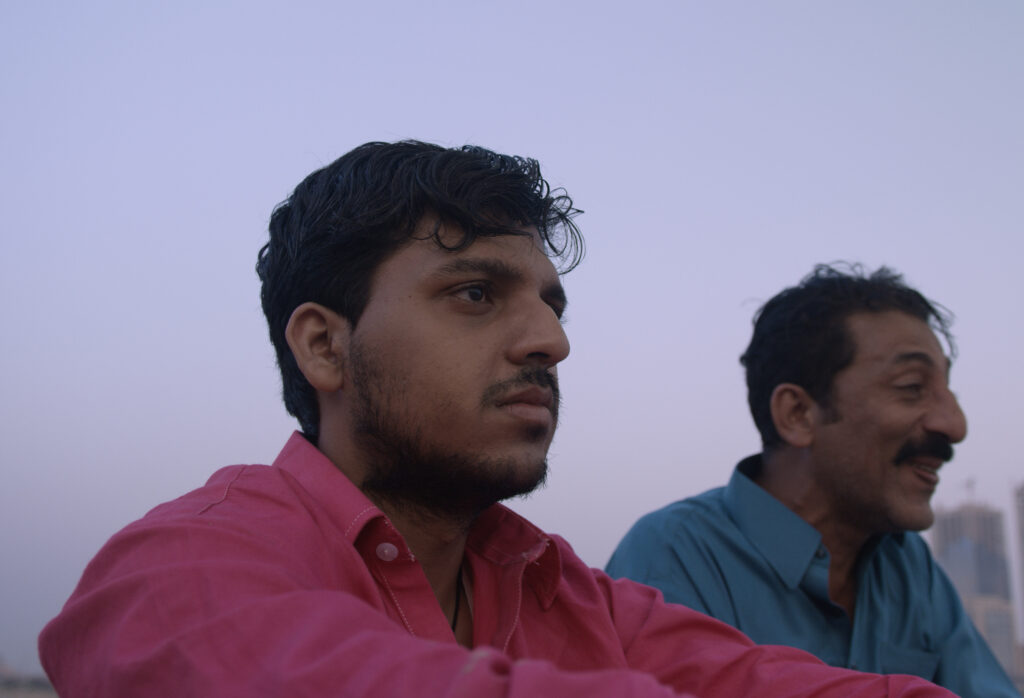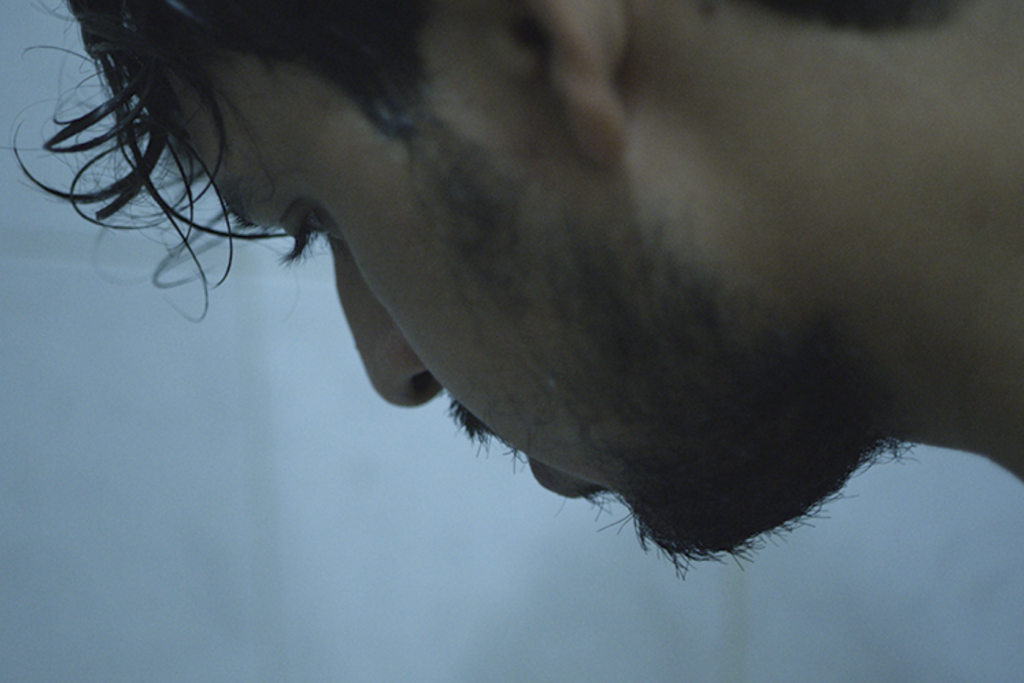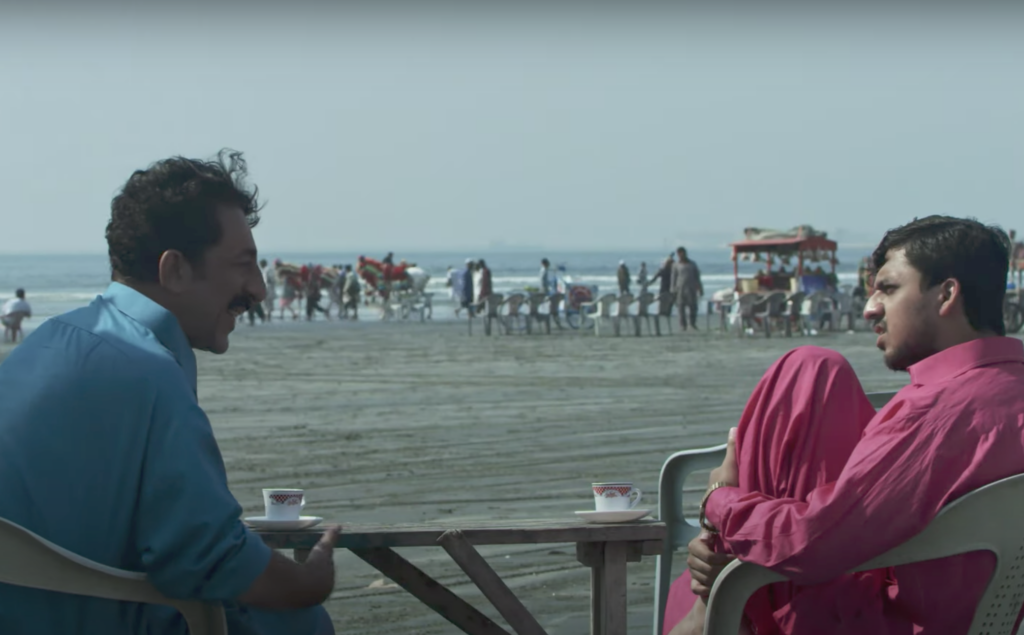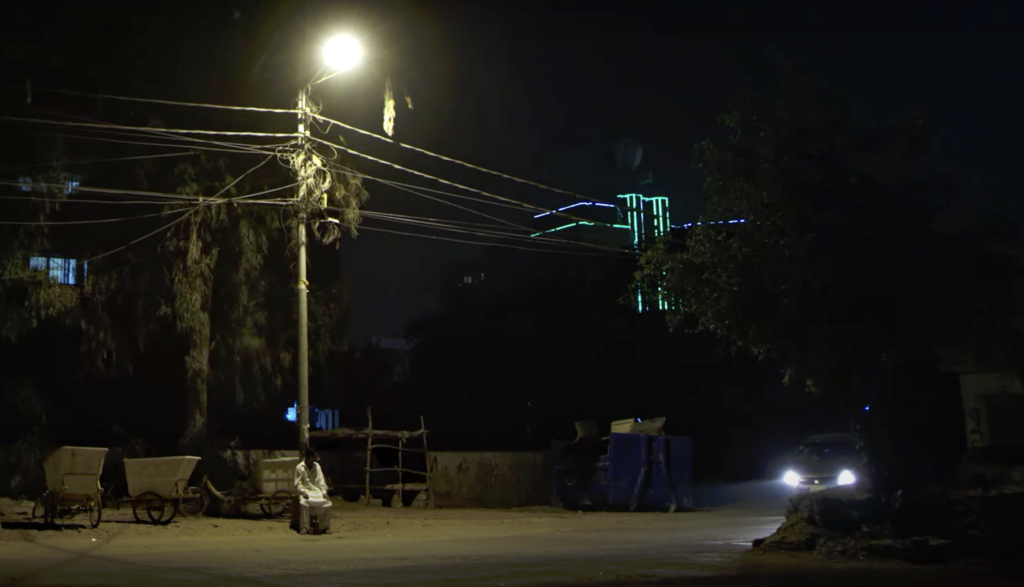
The sky is tinged with blue hues and a dusty rose – sunset – as Iqbal stares out into the Arabian Sea. A stray dog sifts through strewn rubbish nearby on the Karachi beach. There is an overwhelming sense of loneliness, as we follow this maalishwala (masseur), who is struggling to accept his illness and by extension, his profession. This is the setting of “Stray Dogs Come Out At Night,” a Pakistani short form narrative film that was selected late last year to the BFI London Film Festival. The film also makes strides in presenting themes of mental and sexual health; themes often rarely discussed in South-Asian communities.
Dr. Mina Husain is a practising psychiatrist in London, who lended her extensive knowledge and cultural experience to the production process. Stray Dogs Come Out At Night is her second film, (following Dia in 2018) and it delves into the complexities of living two lives; one that is transparent, and one that is shamefully hidden from family or friends. Husain summarises,
“The themes weaved through ‘Stray Dogs Come Out At Night’ bring up critical issues which resonate across cultures.”
The theme of a ‘double identity’ is not entirely unfamiliar to young people today. It can trigger a deterioration of one’s mental health, and evoke intense feelings of loneliness, anxiety, and self-doubt – all emotions felt by the film’s protagonist, Iqbal (Mohammad Ali Hashmi). I sat down with executive producer Dr. Mina Husain (digitally) to discuss the movie’s message and how young people can cope with mental health struggles during a pandemic.
I firstly want to say congratulations for Stray Dogs Come Out at Night, which was the first Pakistani short-form narrative film premiering at the BFI London Film Festival! How do you feel about the nomination?
“Just getting accepted into the BFI – we were over the moon! Myself and my director Hamza Bangash, sat down and had a conversation. We kind of made a last-minute decision to submit the film, not thinking we were going to get it. When I got the email I was literally jumping, telling everyone we got the BFI! We’re also really excited to be nominated for an award!”
How did the story of Iqbal, a maalishwala (masseur) who struggles to accept his illness, come to life?
“My inspiration and reasons for doing this film are quite different from the rest of my team, in the sense of: we come from really different backgrounds. I come from a medical background, I work in mental health, and so I actually got into film when I spent some time in Pakistan. I was working there for a year out of my training programme, and I was working in the mental health hospitals there. That’s where I kind of realised that people were becoming really mentally unwell, before they even accessed mental health services. We know that the longer mental illness is untreated, the worse the prognosis. That’s why we need to catch it early. The reasons why people weren’t accessing the service was because of the lack of awareness about mental illness, as well as the huge stigma that is attached to it. So that’s why I actually got into film! I met Hamza through various connections, reached out to him, and made our first film ‘Dia’ (2018) which is about a young girl that tries to escape a conservative family. She pursues an online relationship, detaches from reality, and it looks at some of society’s reaction to her illness. From there, we wanted to explore depression and anxiety, and focus on the social determinants of health: social factors which affect people’s mental health. We looked at population groups, like young men, who maybe aren’t particularly open about their problems, and migrants, who have their own set of challenges.
That was my first take on it! Then Hamza, who is much more creative than I am, saw particular groups of people around him like the maalishwalas. He lives in Karachi, so he started looking into this and researching. This story is unique to the specific character but the emotions that come from it translate across cultures. What we wanted to specifically explore was the fact that he is a migrant, he moved away from his family, and is essentially leading this double life. He is not able to talk about his profession; he is socially excluded, feeling trapped, and he’s got an illness that he is unable to talk about. Ultimately, he feels lonely and desperate, and that’s what we wanted to portray. The actor, Mohammad Ali Hashmi, also nailed the performance, he had this vacant expression the whole time, like he was there but not really there.”

You said that the “themes weaved through Stray Dogs Come Out at Night bring up critical issues which resonate across cultures” – do you see this especially in British Asian culture?
“I see it a lot in British Asian culture. Number one – this double life thing? It’s huge, even within my friendship circle. I see a lot of people keeping things from those closest to them, like family members. Also, migration. There’s a huge amount of people who have moved into different cities in the UK, away from their family, and also, moving to different countries. London is quite a transient city, similar to Karachi, where a lot of people are coming from various different places to work. I definitely think you can see a lot of these issues in the South Asian communities over here.”
I know it must have been such a huge feeling of pride to represent Pakistan in such an acclaimed stage like the BFI. So, I wanted to ask, why is it so important to bring South Asian stories that are specifically told from South Asian perspectives to wider audiences?
“Ultimately, as a team, we want to start rebranding our culture. South Asian culture has not always been portrayed in a positive light, so we want to really amplify the voices of South Asian actors, directors, writers, and more. That is one of the biggest reasons. Also, the usual stories are very cliché, and you don’t get a grip of what the culture is. We want to present very real stories from Pakistan, rather than the western perception of what Pakistan is.”
I’ve noticed that South-Asian representation is also very limiting, where everything is just labelled as ‘Indian’, when being South Asian includes countries like Sri Lanka, Bangladesh, Nepal, and more]
“Yes, exactly! I think we’re all just lumped into one group of people. Even the term ‘BAME’ sometimes gets under my skin because it’s like, how can we group such a diverse group of people into one category?”
Was producing “Stray Dogs Come Out at Night” very different from producing “Dia,” your 2018 short film?
“We used the same team, which was great! They both came with a different set of challenges, especially with the type of stories we were trying to tell. At the moment, we’re trying to touch on things that are relatively controversial – but do it sensitively. Going through Dia, kind of prepared us for this. We were vague about certain things, because we didn’t want to be ‘in your face’ about it. Dia was very challenging because that was the first time, I had done anything with film and the arts. But it was great to work with a creative team in Pakistan as well as a mental health organisation called Pakistan Institute of Living and Learning. They were the ones who funded this, and the whole collaboration was great – the fact that it was a UK-Pakistan collaboration was awesome.”

What is so powerful about using the medium of film to convey these deeper messages?
“I think nowadays, there’s so much content, and it’s easy to access it. I know, from research, that film is a really influential art-form. The data shows that it shapes the way we perceive things, like the way we perceive mental illness. There have been quite a few controversial films that have come out where mental illness has not been accurately portrayed – it’s been harmful for people, and our speciality as well.
Mental health is quite a unique speciality in that you’ve really got to trust your doctor. I know that is the same in all branches of medicine, however, I feel like in psychiatry, this is the most important – having a good understanding and trust between the doctor and patient. Films like One flew Over the Cuckoo’s Nest really took us a step back, with how people began perceiving treatment as dangerous. I feel that films reflect society, as well as influencing society.”
So, you are a successful practising psychiatrist, as well as being a film producer. These disciplines seem totally far apart. Do you find that the skills are transferable? Does one inspire the other?
“For me, definitely! They seem to marry quite nicely. Firstly, my training programme has been really good – Royal College of Psychiatrists – in allowing me to pursue this and take time off when I needed it. I guess in terms of representation of characters, having a background in mental health has really helped. However, a lot of stuff in the film has helped me in my clinical practises as well. To be in mental health – you really need to question your own perspective. You can’t be a good psychiatrist and be judgemental, you know? So, hearing other people’s stories and perspectives, especially from the people that I’m working with, like the cast and the crew, helps me in my job. Both of them help me work on the other, if that makes sense. They seem like they’re worlds apart, but they’re actually very similar!”
You’re an adviser to Colourful Minds, an organisation I’m familiar with as a student in London. Could you tell me more about your work there?
“I’m part of the team there! Colourful Minds is an organisation which is looking at supporting the mental wellbeing of children in the BAME community. The starting aim was to reduce the stigma of mental health and start off with schools. But now, we have expanded to giving more general tips on wellness, and going into schools and religious places like gurudwaras, mosques, and churches, to support children who come from deprived backgrounds. We have got a great team of people to provide these sessions. It’s based in London but we’re looking to expand!”

The times we are living in are so extraordinary, and honestly, terrifying. So, it’s unsurprising that a lockdown environment causes specific mental health issues to flare up – how do you think young people, specifically in the BAME community can combat these challenges?
“We have a lot of strengths, specifically in our South Asian culture, like family values, or how tight knit our communities are. I feel like we need to amplify our strengths, like leaning on family members and starting conversations. The other thing we need to focus on is actually religion. Again, a lot of South Asian people are practising various religions, and I think religion does provide a sense of hope and can be an anchor for people. Ultimately, we’ve got to look after ourselves. Basic things: have a healthy diet, get out, exercise, and make sure your sleep is adequate. Look after yourselves and lean on each other during these difficult times.”
You said an extremely important point: “It is imperative that health services adapt to meet the needs of the largest ethnic minority group in the UK.” Where do you feel health services, government outreach, and even the education system has fallen short? Where can they do more?
“I can talk specifically about mental health. I think everybody’s learning. The expression of distress looks different in different minority groups. Somebody who’s South Asian and is depressed is going to (or can) express it differently than how a white person would express it. We need to start understanding this, and it also needs to go into our curriculums. We need more representation, like when we’re practising doing clinical interviews in medical school. We need to start involving different members of various communities.
I also think that we need to push representation as a community. For example, there aren’t actually that many South-Asian therapists, and we know that in order to have effective therapy, you need that patient-therapist relationship, and so, an understanding of culture is so important for that. Your therapy needs to be culturally adapted – it cannot be generic.”
This is a huge question, but something I’m truly passionate about. What steps can we take to destigmatise mental health conditions in the South-Asian community?
“I think that there are so many different campaigns and strategies we can use. Things like mental health days, suicide prevention days – all of these campaigns are beneficial. Film and media is an important tool. Our own platforms, like social media, can be utilised to start the dialogue. Community events, publications, and public spaces, when they get opened, can also be used. I think film is a great way to do it because it’s very non-personal. You can talk about something without bringing your own vulnerabilities into it.”
[Read Related: ‘Little Voice’ Star Shalini Bathina Talks BIPOC Representation & Mental Health Advocacy]
As we settle into a new year, what advice can you give young people (who are predominantly doing remote learning) to stay healthy?
“I’m a person who can get inside their own head so I think to young people, I would say, to the things that aren’t serious, don’t take it so seriously; put things into perspective. Then I’d say all the basics again, look after yourself, look after your physical and mental health, sort out your sleep, and talk to people that you trust. Finally, don’t be afraid to get professional help, because sometimes, people need it. We’ll probably all need it at some point in our lives and there’s absolutely no shame in getting it.”




